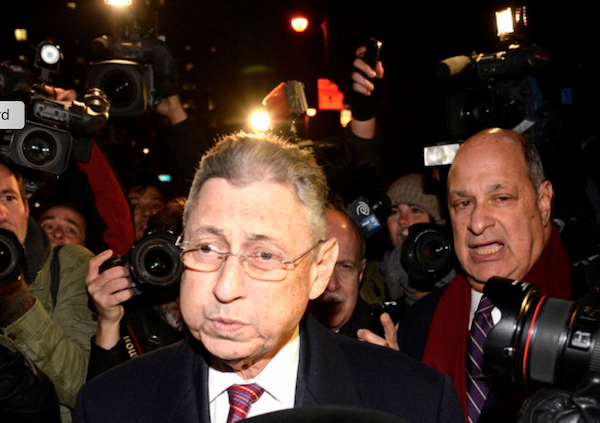
BY PAUL SCHINDLER | It may not be surprising that the sentencing of a convicted ex-State Assembly speaker went down this week with little public fanfare — what with a federal criminal probe underway into possible bid-rigging on public contracts by a former top aide and longtime intimate of Governor Andrew Cuomo and a criminal referral by the State Board of Elections regarding campaign fundraising by Mayor Bill de Blasio and his inner circle.
Still, we have to resist the temptation to weigh the latest news as the most important news and instead make some effort to distinguish the types of corruption we are talking about in each case.
First, let’s consider the May 3 sentencing of former Assembly Speaker Sheldon Silver, the Lower East Side Democrat who led the Legislature’s lower chamber with an iron fist for 21 years beginning in 1994. In November, Silver was convicted on multiple counts of fraud, extortion, and money laundering in connection with various schemes he hatched to pocket nearly $4 million in exchange for using his office to benefit a cancer research center and several real estate interests.
Silver not only personally profited, but he also leveraged the lack of transparency in state budgeting to hide the favors he was doing for those he profited from. He stole at the expense of the public, and he manipulated the system so the public would never understand how its money was being spent.
Federal prosecutor Preet Bharara urged the court to give Silver a longer sentence than any state legislator has ever received —and there are many convicts in this category to choose from. Judge Valerie Caproni did not quite meet that challenge, but a 12-year sentence for a 72-year-old man certainly does send an appropriately strong message.
The probe by Bharara’s office into the ex-Cuomo aide, at this stage, involves suspected corruption one step removed from the governor himself. Joe Percoco, who is widely reported to be the key subject of investigation, has worked in the Cuomo administration, from which he took a leave of absence in 2014 to join the governor’s reelection campaign. The inquiry is said to involve income earned by Percoco and his wife from business interests that won state contracts on projects including Cuomo’s major Buffalo economic development program and also made big contributions to his reelection campaign.
Potential corruption of this sort by a top aide to an elected official would be big news under any circumstances, but it is particularly noteworthy given Percoco’s tight relationship with Cuomo, for whom he worked as early as the governor’s tenure as federal housing secretary in the 1990s. At Mario Cuomo’s funeral in early 2015, the governor described Percoco as “my father’s third son who sometimes I think he loved the most.” Those watching the unfolding scandal are asking whether Percoco could have engaged in significant corruption, especially related to campaign contributions to the governor, without Cuomo’s knowledge. The announcement by the governor’s office last week that it was launching its own investigation into possible conflicts of interest in the Executive Department was widely seen as Cuomo’s effort to get ahead of any bad news and distance the governor from it if it is uncovered.
The questions regarding de Blasio and campaign finance violations are also being framed as criminal behavior, though here the allegations do not involve anyone personally profiting, but rather actions by the mayor’s aides and possibly de Blasio himself to create a structure to evade state political funding restrictions. The allegations, contained in a criminal referral from the State Board of Elections, involve “Team de Blasio” soliciting labor union contributions to county Democratic committees with the intention of those committees, in turn, giving the money to State Senate candidates in amounts above what the unions could have contributed to them directly.
The referral has resulted in both Bharara and Manhattan District Attorney Cy Vance issuing subpoenas to top de Blasio aides, though apparently not to the mayor himself.
The fact that the criminal referral came to light, however, is not without its own controversy. The State Board of Elections is headed up by Risa Sugarman, a Cuomo appointee who formerly worked for him when he was attorney general — an issue raised by good government groups at the time she was nominated for her current post. The criminal referral, which is supposed to be confidential, was made on January 4, but only leaked two weeks ago, just ahead of news of the criminal probe into Percoco. Defenders of the mayor are saying or clearly suggesting that Sugarman is doing dirty work on behalf of the governor, who has missed few opportunities to embarrass the mayor. Cuomo, in turn, noting that two Republicans sit on the four-member Board of Elections and that the original complaint came from the GOP, argued that the referral going public should surprise no one.
Observers, including Jim Dwyer at the New York Times, have also noted that other elected officials — such as former Mayor Michael Bloomberg, when he hoped to retain a Republican State Senate majority — have directed funds to campaign committees that then passed them along to that official’s favored candidates.
In fact, good government groups — without offering a view of what may or may not happened with de Blasio and his aides — point out that the ease of evading campaign contribution limits in this way is a systemic flaw in need of a correction in state law.
The influence that de Blasio, Bloomberg, and others have sought to exercise over state election contests is clearly at odds with the spirit of campaign finance law, which should be significantly reformed. Whether there is anything criminal here is an entirely separate question.

































